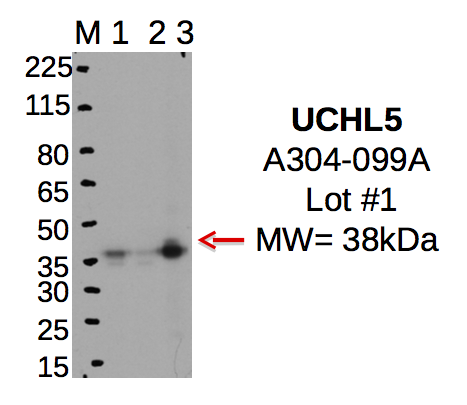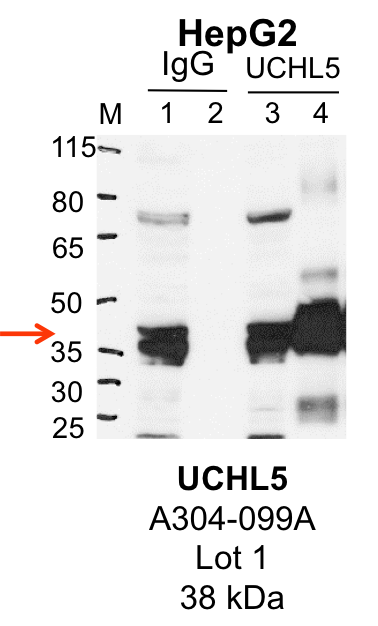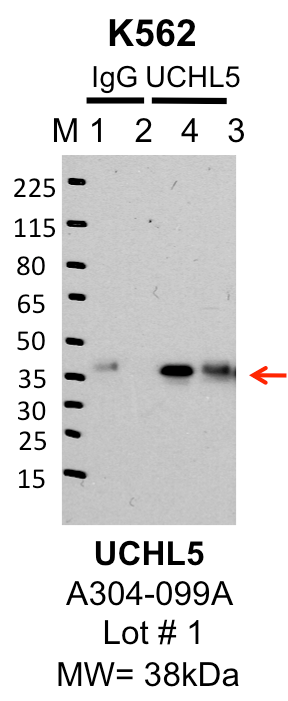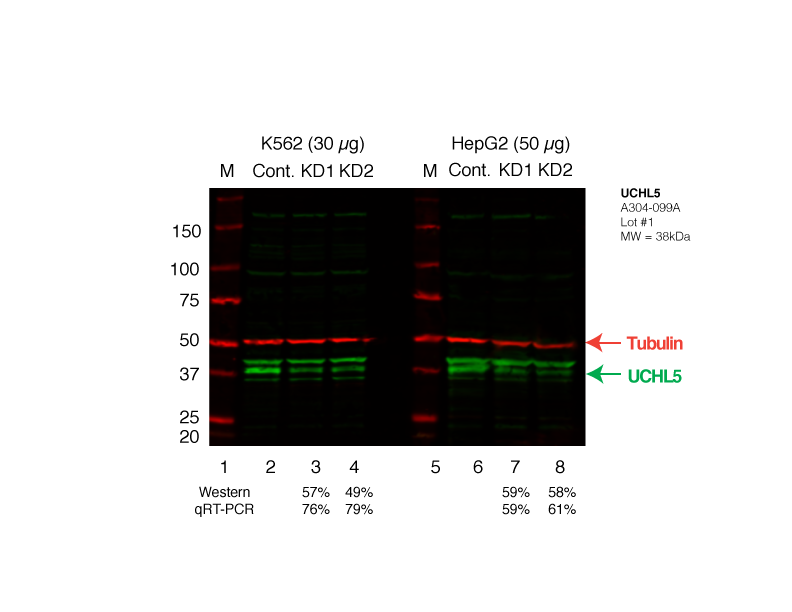ENCAB421XHI
Antibody against Homo sapiens UCHL5
Homo sapiens
HepG2, K562
characterized to standards
Homo sapiens
any cell type or tissue
partially characterized
- Status
- released
- Source (vendor)
- Bethyl Labs
- Product ID
- A304-099A
- Lot ID
- 1
- Characterized targets
- UCHL5 (Homo sapiens)
- Host
- rabbit
- Clonality
- polyclonal
- Purification
- affinity
- External resources
Characterizations
UCHL5 (Homo sapiens)
not submitted for review by lab
- Caption
- IP-WB analysis of K562 whole cell lysate using UCHL5 specific antibody. Lane 1 is 2.5% of 0.5mg input lysate, lane 2 is 2.5% of supernatant after immunoprecipitation and Lane 3 is 50% of IP enrichment using rabbit polyclonal anti-UCH37. This antibody passes preliminary validation and will be further pursued for primary and secondary validation.
- Submitted by
- Balaji Sundararaman
- Lab
- Gene Yeo, UCSD
- Grant
- U54HG007005
- Download
- Bethyl_A304-099A_1_UCHL5.png
UCHL5 (Homo sapiens)
HepG2
compliant
- Caption
- IP-Western Blot analysis of HepG2 whole cell lysate using UCHL5 specific antibody. Lane 1 is 1% of twenty million whole cell lysate input and lane 2 is 25% of IP enrichment using rabbit normal IgG (lanes under 'IgG'). Lane 3 is 1% of twenty million whole cell lysate input and lane 4 is 10% IP enrichment using rabbit polyclonal anti-UCHL5 antibody (lanes under 'UCHL5').
- Submitted by
- Steven Blue
- Lab
- Gene Yeo, UCSD
- Grant
- U54HG007005
- Download
- HepG2_Bethyl_A304-099A_1_UCHL5.png
UCHL5 (Homo sapiens)
K562
compliant
- Caption
- IP-Western Blot analysis of K562 whole cell lysate using UCHL5 specific antibody. Lane 1 is 1% of twenty million whole cell lysate input and lane 2 is 25% of IP enrichment using rabbit normal IgG (lanes under 'IgG'). Lane 3 is 1% of twenty million whole cell lysate input and lane 4 is 10% IP enrichment using rabbit polyclonal anti-UCHL5 antibody (lanes under 'UCHL5').
- Submitted by
- Steven Blue
- Lab
- Gene Yeo, UCSD
- Grant
- U54HG007005
- Download
- K562_Bethyl_A304-099A_1_UCHL5.png
UCHL5 (Homo sapiens)
compliant
- Caption
- Western blot following shRNA against UCHL5 in K562 and HepG2 whole cell lysate using UCHL5 specific antibody. Lane 1 is a ladder, lane 2 is K562 non-targeting control knockdown, lane 2 and 3 are two different shRNAs against UCHL5. Lanes 5-7 follow the same pattern, but in HepG2. UCHL5 protein appears as the green band, GAPDH serves as a control and appears in red.
- Submitted by
- Brenton Graveley
- Lab
- Brenton Graveley, UConn
- Grant
- U54HG007005
- Download
- UCHL5_Secondary_Western.png



